My quest to hang half a 100: coaching Arkansas State offense in spring game was harder than it appeared
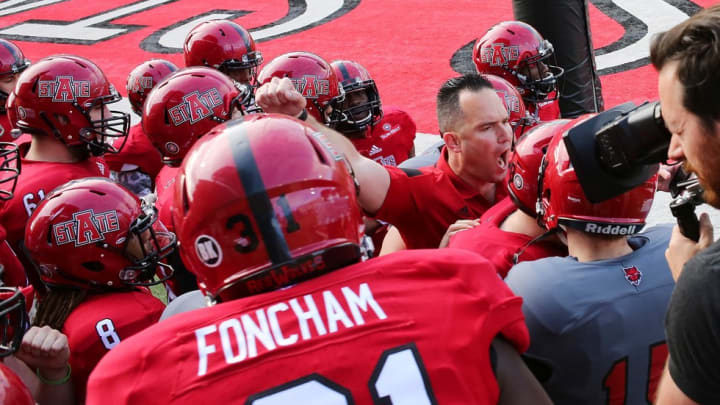
[video: 13724915]
JONESBORO, Ark. — On the way to my first stop as a guest coach for Arkansas State's spring game last Friday, Red Wolves coach Blake Anderson tried to warn me. As I rode away from donor Ryan Heringer's MTV Cribs-style house in a luxurious black Sprinter van adorned with the school's logo, a video of Anderson played on the vehicle's high-definition, flat-screen television.
"Welcome to the hot seat of FBS coaching," Anderson said.
I laughed at Anderson's words. After all, I've spent countless games on the sideline since I started writing about college football more than 15 years ago. I knew I could coach because before covering collegiate athletics, I was an assistant for an NCAA Division II basketball team. I was also a college basketball player.
Plus, I would be in charge of Arkansas State's pedal-to-the-metal offense in the spring game. The Red Wolves won the Sun Belt championship last season en route to finishing 9–4, thanks in part to their light-speed attack that ranked 12th in the FBS in scoring (40 points per game).
Anderson has yet to settle on his starting quarterback for 2016 and has a new offensive coordinator and quarterbacks coach in Buster Faulkner. Still, the team returns six offensive starters. So as soon as I found out I was coaching the offense, I tweeted #HangHalf100.
It was short for former Oklahoma and Dallas Cowboys coach Barry Switzer's famous saying of, "Let's hang half a hundred." It fit because I'm an aggressive person, and I pride myself on winning more than Charlie Sheen.
Never mind the fact that the scrimmage would last only for a half or that the offensive line would be without four returning starters, leaving me with just two. Damn it, I was going to score 50, which I figured would be more than enough to win in my matchup coaching against the program's defense.
"Have fun," Anderson said later in the video, "and try not to get fired in the first day of your head coaching job."
If only I had heeded Anderson's advice.
*****
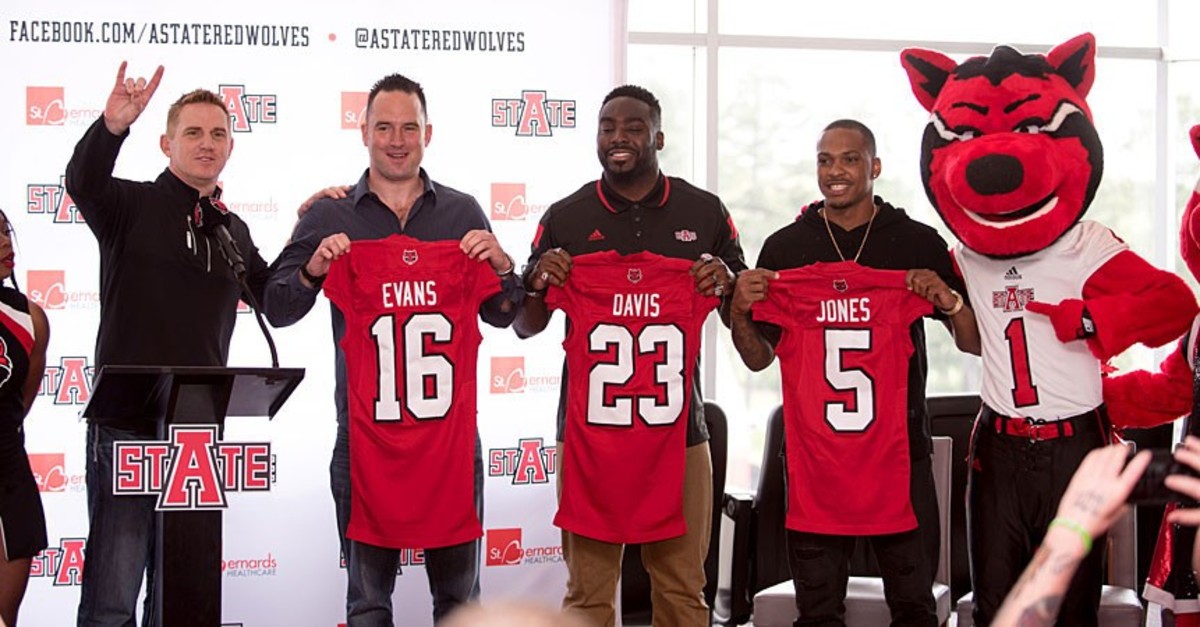
Courtesy of Arkansas State University
Anderson knows plenty about having fun. The redheaded 47-year-old has a lot in common with Clemson coach Dabo Swinney. Anderson, who played quarterback and wide receiver at Baylor before finishing his career at Sam Houston State, is just as folksy as Swinney, and he's also driven by three Fs. Their first two (faith and family) are the same as Swinney's. While Swinney's third F stands for football, though, Anderson's third F stands for fun.
Eleven years ago, football wasn't fun for Anderson. As he steadily climbed up the coaching ranks as an assistant, he was always the first one in the office and the last one to leave. "I didn't have any pedigree, wasn't some great player and I didn't have some great last name," Anderson said. "So I was going to work my way into a position. I just grinded it, because I'm a naturally driven person and I love the game."
On the rare occasions Anderson had time off, he visited other coaches, working at a clinic or volunteering at a football camp. He didn't spend enough time with his wife, Wendy, and his three children, Coleton, Callie and Cason. "I was still acting like a college kid," Anderson said. "I was ripping and running, hanging with the dudes, spending time at the club, drinking too much beer."
While Anderson tried to rationalize his decision as trying to provide for his family, he knew he was being selfish. The reality was that he was a workaholic and absentee husband who didn't know his children.
In the spring of 2005, while Anderson was the co-offensive coordinator and quarterbacks coach at Middle Tennessee State, he received a text message from his wife that changed his life forever. "I've already told your parents," the message read, "but I'm leaving you and taking the kids."
Anderson was in a staff meeting at the time. He got up without saying a word and drove home, where he spent hours talking with his wife.
"If I quit my job today and we can work on our marriage, I work on my relationship with Jesus Christ and get to know my kids, will you stay?" Anderson asked.
Anderson's wife didn't answer. She spent the next 10 minutes in painstaking silence, the longest moments of Anderson's life.
"Yes," she told Anderson, "but that's it."
The next day, Anderson quit his job at Middle Tennessee State. He and his family moved to Hubbard, Texas, to live with his parents on their farm. "I was scared to death," Anderson said. "I didn't have any guarantees. I just knew my life was broken and had to be changed. My wife and kids were more important than anything else and they had not been."
Besides Anderson's new commitment to faith and family, he also pledged to help his father, Scott, who had recently survived a heart attack. He took over his father's business selling life insurance and ran his parents' farm. Anderson and his wife also started attending counseling sessions. He became more involved with his kids, even coaching his oldest son's basketball team. (It went undefeated.)
But Anderson still had the itch for football. So, in exchange for teaching Texas high school football coaches his tempo spread offense, he made them first sit through his hour-long life insurance sales pitch. Then they talked X's and O's for hours.
Two seasons later, when Louisiana-Lafayette offered Anderson a job as its offensive coordinator and quarterbacks coach, he sat down with his wife and told her that he thought God wanted him to take the job. "But I'm promising you, like I'm promising Him, that I will never do what I did before," Anderson told her. "I will never be that person. I will put my faith and my family first."
Anderson has never looked back and went on to become the offensive coordinator and quarterbacks coach at Southern Miss (he worked at the school from 2008–11, the final two seasons in this role) and then North Carolina (2012–13). When he was hired at Arkansas State in late 2013, he made faith, family and fun the cornerstones of his program.
He doesn't have staff meetings until 8:30 a.m. to allow his assistants to take their children to school. During the season, Anderson and his staff are usually home by 7 p.m. and they don't work on Sundays.
Anderson has a story to tell, one that's intriguing to Power 5 athletic directors who will be hiring during the next coaching cycle. He is now entering his third year at Arkansas State after his three predecessors—Hugh Freeze, Gus Malzahn and Bryan Harsin—each left after a season for better jobs.
Anderson might have been gone by now, too, if his contract did not include a $3 million buyout over his first two seasons that has now dropped by a million. If he does leave, though, his new job will come on his terms.
"We're doing family and we're doing faith," Anderson said. "We just simplified and balanced for our players, our families and for us. I'm a better coach now than I ever was at any point in my career."
*****
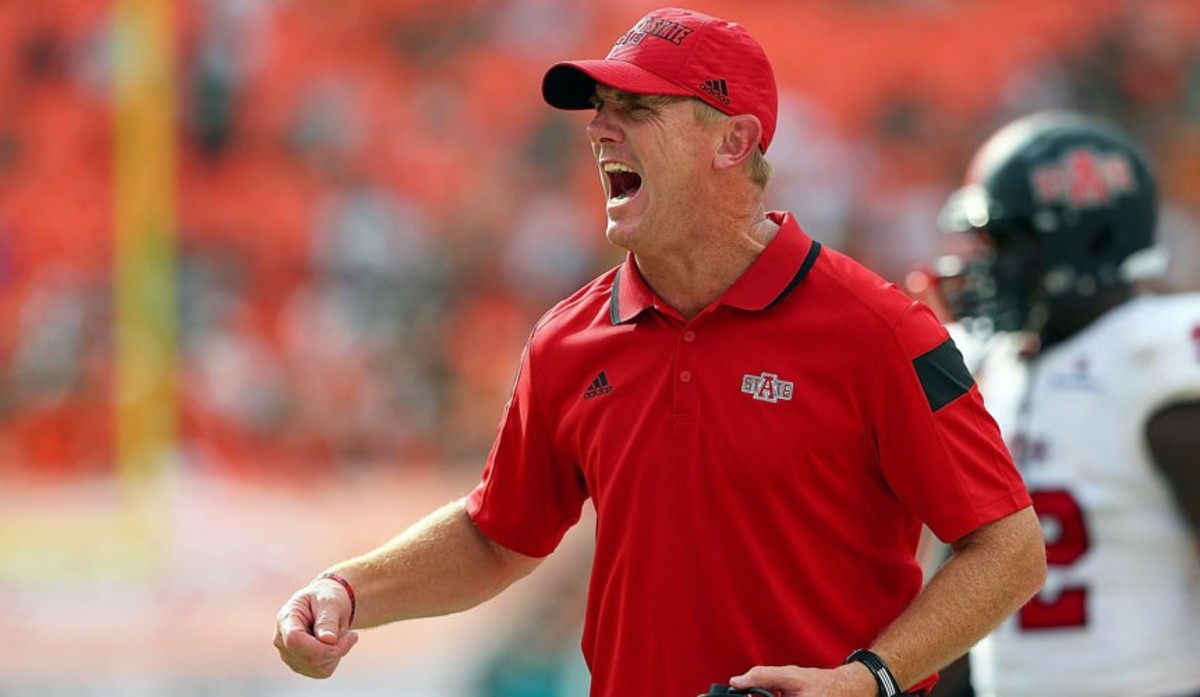
Mike Ehrmann/Getty Images
I thought coaching the spring game would be easy. After all, I'm in the business of breaking news about the hiring and firing of coaches. I'm supposed to be able to explain why good ones win and bad ones lose.
Still, I called several coaches for advice, including former East Carolina coach Steve Logan, one of college football's most underappreciated offensive minds. He was drinking a glass of wine when he answered. I explained my role in Arkansas State's spring game and asked for his favorite play so I could run it.
Over the next 10 minutes, Logan walked me through how to run an option reverse pass. The only problem was I didn't know exactly how to draw it up, so after scribbling out my 11 offensive players, I just wrote down everything he said near each position.
"Everywhere I've ever ran it, I've scored a touchdown," Logan told me. "Lots of them."
That was all I needed to hear. There was one touchdown I could count on in my quest to score 50 points.
I also thought I could count another score based on my advance scouting of the Arkansas State offense. In the week leading up to my arrival, one of the program's strength and conditioning coaches tweeted a video that showed redshirt freshman wide receiver Omar Bayless doing a backflip. So, when my offense practiced trick plays the day before the spring game, I decided to add Bayless's flip to a double-pass play. He would do a backflip while lined up behind another receiver on the left side, then catch the lateral and throw a touchdown pass to a receiver streaking downfield.
The play was called Freak, and it worked both times we ran it in practice. Granted, that wasn't against a defense, but we were ready to get our freak on. I just had to work on the signal for the play, which receiver Cameron Echols-Luper showed me was a quick pelvic thrust. I figured I'd practice the move later, but when the entire team gathered at the end of Thursday's practice, I was asked on the spot to give the signal.
What followed was an incredibly awkward attempt, roars of laughter and more credence given to the notion that white men can't dance. Among those chuckling the most were the defensive guest coaches, Cleveland Browns linebacker Demario Davis and defensive back Don Jones.
"This is the guy we're here to beat?" Davis asked with a laugh.
Very funny, I thought, as I walked off the practice field. I'll show them who gets the last laugh.
*****
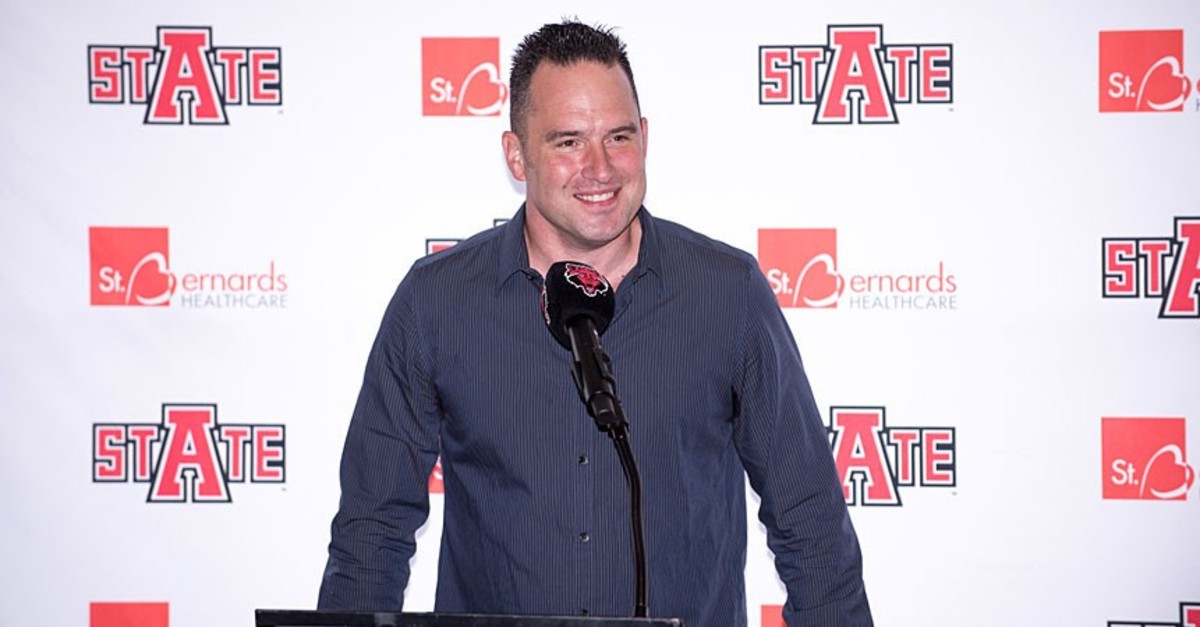
Courtesy of Arkansas State University
The day of the spring game was dizzying from the moment I arrived to sign my one-day contract at a press conference. The Red Wolves' cheerleaders and mascot overwhelmed me as soon as I stepped off the elevator.
Answering questions from the media came as second nature. I confidently backed up my #HangHalf100 tweet, and some reporters tried to create a war of words pitting me against Davis and Jones.
It was all in good fun, only this time Jones wasn't nearly as vocal as he had been the night before. Jones admittedly isn't a fan of public speaking, but he was plenty confident. After a couple of drinks Thursday night, Jones leaned over to me and said, "We're still going to whip your ass tomorrow." I laughed.
A few minutes later, Jones leaned over and said the same thing, only this time with greater emphasis. NFL player or not, I was hardly about to be intimidated by someone I didn't even know was in the league until I looked it up on the Internet. (Sorry, Don, it's the truth.)
This time I didn't laugh. I replied: "I've beaten plenty of guys better than you."
O.K., so I hadn't in football, but playing hoops over the years, I had been on teams that beat opponents with future NBA standouts. Neither Jones nor I said anything else that night, but I didn't forget his words.
After the press conference came a blur of a campus tour, a visit to Textbook Brokers and a stop by the office of Jonesboro mayor Harold Perrin, who gave me a key to the city. I shook hands and took photos like I was running for the role. I tried to document it with timely tweets, but could barely keep up.
Later I met with Faulkner, Arkansas State's offensive coordinator and quarterbacks coach. He had warned me about the struggle we faced without four starting offensive linemen, particularly against a defense that returned nine starters. The Red Wolves' unit ranked first in the FBS in touchdowns scored (8) and tied for second nationally in turnovers gained (34) last year behind underrated defensive coordinator Joe Cauthen.
"I'm not going to lie," Faulkner told me, "we're going to have our hands full."
Still, I wasn't worried. If anything, I was emboldened, especially after I received a text from an SEC staffer insisting that we use a four-wide-receiver set on the first play and have each run verticals deep.
Faulkner and I decided that would be the first play. Then we tried to install the play Logan gave me using my notes, but we had to call Logan and have him explain it again. After 10 minutes on speakerphone, Red Wolf Ready Break was in the playbook.
"You're way too deeply invested in this, I promise," Logan warned.
He was right, just like Anderson had been in the video about having fun. Not that I was listening.
*****
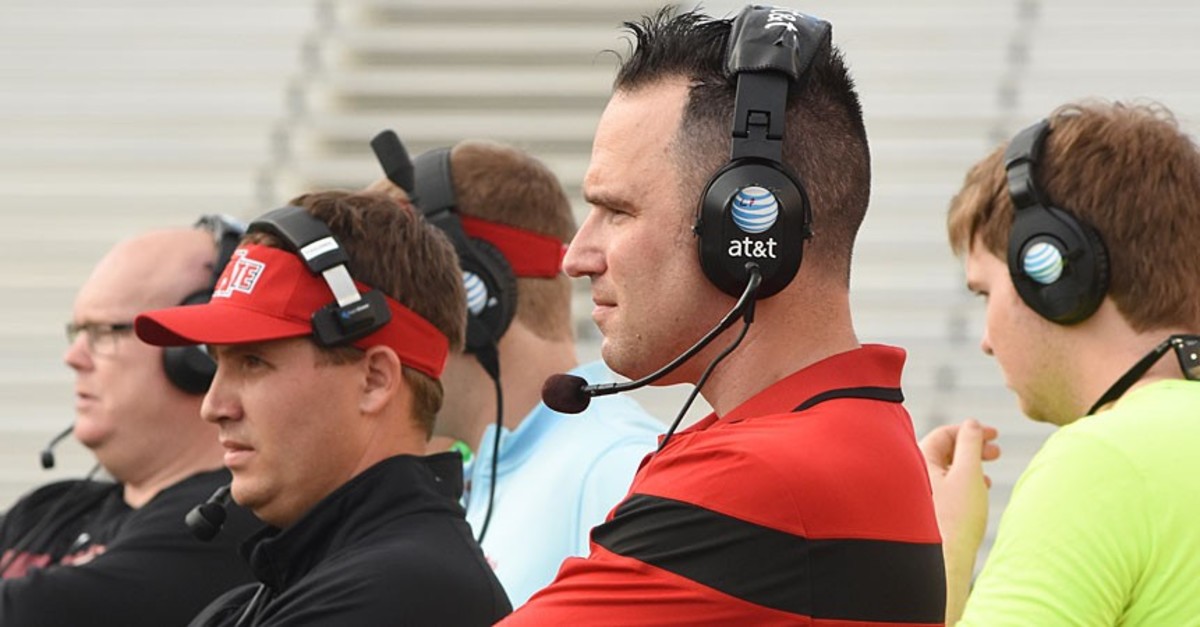
Courtesy of Arkansas State University
Just before took the field, I gathered my offense for a pregame speech. Most of the players had spent the last few minutes dancing to rapper 21 Savage's song "Skrrt Skrrt."
"Kill this s---, coach!" one of the players bellowed.
In advance of my speech, I had asked Faulkner what he hoped to emphasize to his offense, and he gave me some coachspeak. I mixed that in and said we wanted to play fast and with great tempo. I stressed to the seniors that this was their last spring game, and to enjoy the moment. First, though, I was clear about my expectations. "I don't care about fun, I care about f------ winning," I said. "That's what this is about. I want to score 50 f------ points."
There was a small roar from my offense. I tried to fire them up further by explaining the defense had been talking trash, especially Don, one of opposing guest coaches, who I told them I had no idea was in the NFL.
The players roared louder. Then I told them to give me something to show the rest of college football and that would instill fear in Auburn, which Arkansas State plays this fall in Week 2. Finally, to keep things loose, I showed off my improved moves for a potential Freak play-call, which sparked laughter and some chanting.
It's a hell of a challenge trying to bond with players in just over 24 hours. Anderson later told me he heard my speech was "awesome," which very well might have been him being polite.
Prior to my speech, I was worried for the first time about my 50-point prediction. I had always thought losing coaches were being cliché when they said after games that their guys looked lackadaisical from the moment they hit the field for warm-ups. But as the pregame clock ticked away, I started to get that sinking feeling. I tried to fire up my players with impassioned motivation, which generally resulted in long, blank stares and the occasional, "O.K., coach."
My fears were further reinforced when we went back to the locker room and I heard wide receivers coach Luke Paschall tell his group that it had better not play like it warmed up. (That's the G-rated version.) But before I even spoke, I had already taken matters into my own hands.
Well, into the hands of the scoreboard operator, that is. If my offense didn't hang half a hundred, I had coaxed equipment manager Jason Jones into having the operator change the score as soon as time expired to the 50 points I promised. I'd then quickly tweet a photo of the scoreboard and those not in attendance would believe I backed up my prediction.
I couldn't lose, right?
*****
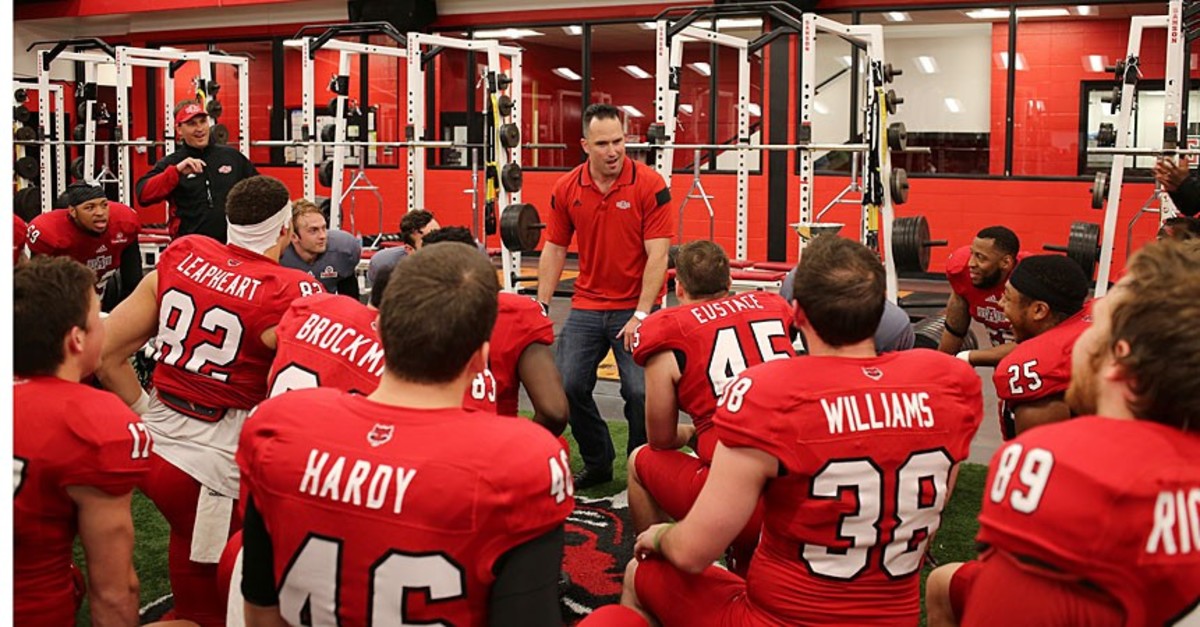
Courtesy of Arkansas State University
I'm not sure there's a lonelier feeling in football than standing on the sideline and watching your offense not be able to move the ball. I knew we were in for a long night when redshirt sophomore quarterback Justice Hansen was sacked on the first play, the one with the four wide receivers running deep patterns. The pass rush had gotten to him in less than one Mississippi.
That would be a theme the rest of the game. I had badly underestimated the toll of being without the four starters on the offensive line. As fast as we called plays, the defense was even faster. It riddled us its Cover-2 scheme, and we were simply overmatched up front.
No amount of screaming, swearing or Sharpie throwing was going to fix that. My concern that we weren't going to score 50 points was quickly becoming reality. That was even with Anderson's more-than-generous scoring system: It awarded points for not only touchdowns and field goals, but also for flipping the field and, yes, creating a turnover off our own turnover.
I could hear the crowd's impatience with the offense's struggles, despite the chatter of my assistants over our headsets. Even worse, I knew exactly what the fans were saying.
"Thayer Evans should stick to writing articles, not playbooks," one of the fans taunted.
I'll shut them up, I thought. I decided to call Logan's play.
I knew it would work. Remember, Logan said he had scored a touchdown everywhere he called the play.
The only problem is I'm not Steve Logan. I was optimistic about the play working until Dijon Paschal, the wide receiver throwing the ball, was nearly tackled for loss on the option reverse. He ended up getting off the pass, but not before getting crunched and having the ball fall incomplete down the sideline.
After that, I wanted to fire myself. I tried to encourage my offense, but I often found myself muttering expletives or seizing on the opportunity to curse at an official.
If we had anything that worked offensively, it was the jaw-dropping Echols-Luper, who is listed on Arkansas State's roster as an "athlete." The redshirt junior sat out last season after transferring from TCU. He was electrifying carrying, catching, throwing, returning and even punting the ball.
"Let's give it to him every time," I told Faulkner.
Eventually we converted a double-pass, thanks to Echols-Luper, and scored a couple of touchdowns. Still, our offensive performance was painful to watch.
Bad turned to worse when junior receiver Chris Murray fell to the turf clutching what ended up being a broken right ankle. If Anderson had stopped the game then, I would have been fine with it. Anderson later admitted he had indeed thought about ending the scrimmage portion after Murray's injury. No longer did I dare run the backflip, double-pass play. I was a lot more careful with Echols-Luper, too.
All I cared about was my offense escaping alive against a helmet-rattling defense that had delivered far more big hits than we had big plays. And while my linemen weren't dominant in their blocking, they dominated the punt-catching competition, adding crucial points to the scoreboard.
Despite coughing up two turnovers, we still had a chance to win on the game's final play, thanks to liberal scoring from Anderson. Trailing 43–42, we had the option of going for the tie or for a two-point conversion.
Of course I chose the latter, because I thought my beleaguered offensive line could get us three yards on a run. We'd been throwing the ball most of the game; perhaps this would surprise the defense. It didn't.
The play of the night, though, might have been right after that, when I deftly avoided a Powerade shower by my team. There was no way in hell I was letting them drench me following a loss.
Afterward, I don't really remember shaking hands with the other team. I was that pissed we lost.
When I turned to look at the scoreboard, sure enough, my 50 points were there. I quickly snapped a photo while pointing to my half a hundred.
Just after I tweeted the photo, Arkansas State media relations director Jerry Scott thankfully informed me that I wouldn't have to take part in the postgame press conference. Now I know exactly why some coaches despise talking to the media.
Losing is no fun.
*****
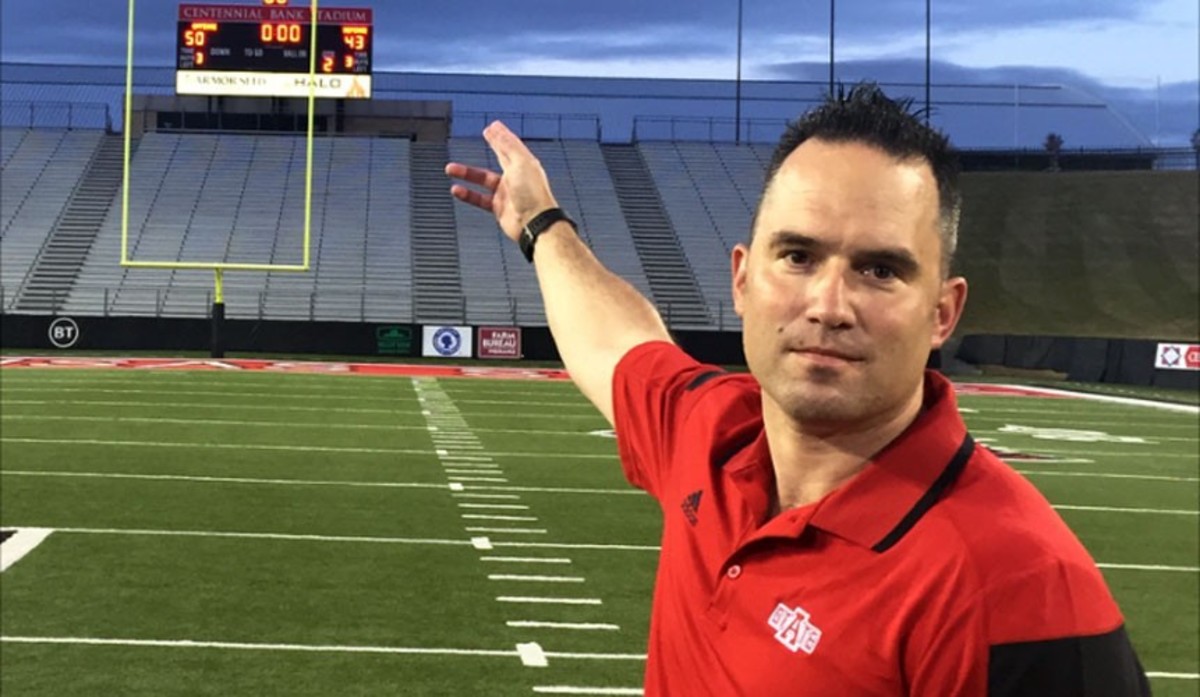
Thayer Evans
When a chipper Anderson picked me up the next morning for breakfast, he had already been to the hospital to visit Murray, who was fresh off having surgery. Anderson had worked late after Friday's game, securing verbal commitments from three recruits.
As Anderson and I talked over croissant French toast, I asked if he was surprised by my offense's lackluster performance. "It's what I expected," he said. "We've struggled because of our offensive line problems. It's been the most challenging spring I've ever had because of the offensive line injuries and depth issues. Hopefully I'm wise enough that I've continued to tell my coaches that we're going to be fine. Those guys are going to be healthy in the fall and we're bringing some guys in, but it's been frustrating on a daily basis."
Anderson paused and then laughed.
"Honestly, I got out of it what we thought we'd get," he said. "We struggled to block. We struggled to run. We popped a couple big plays. We had a couple of big trick plays that hit. Everybody had fun."
And that included me. I just didn't realize it until I woke up Sunday morning back home in Texas.
I missed the camaraderie of Anderson, his staff and the players. It was something I hadn't experienced since I stopped coaching more than a decade ago. But I kept going back to what Hansen told me just after I left the locker room following Friday's game.
"I don't know what kind of contract they signed you to," Hansen said, "but we'll take you back."
Maybe Arkansas State will have me back someday. Next time, though, I'll listen to Anderson about having fun—and better yet I'll win.
